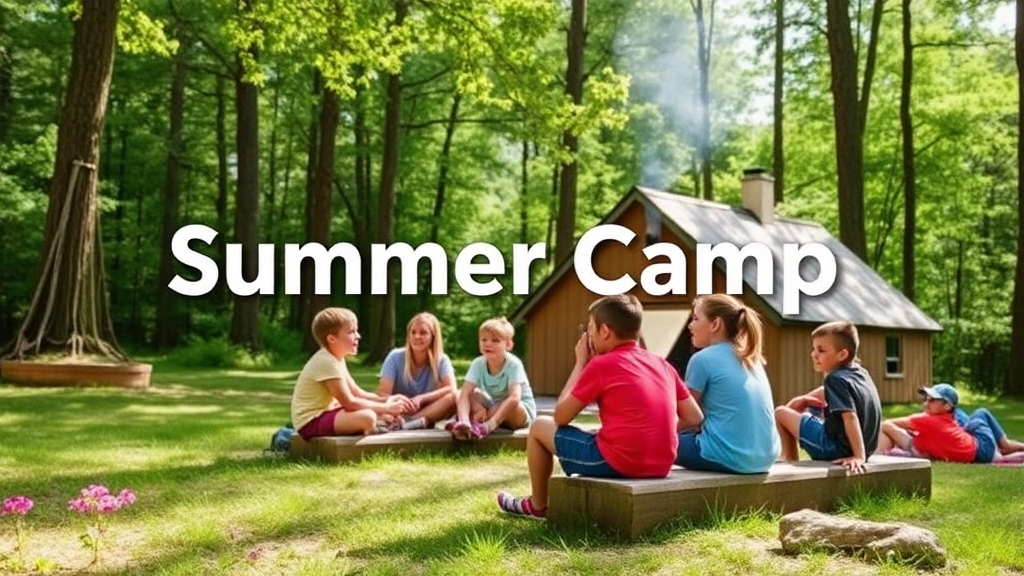Exploring Summer Camps
Ever wonder what makes summer camps so special and whether they’re the right fit for your child? You’re not alone. In this article, we’ll delve into the definition of summer camp, exploring its various types, key activities, and the myriad benefits it offers. From traditional camps to specialized ones, there’s something for every child’s interest and need.
We’ll guide you through the process of choosing the right camp, weighing the pros and cons of overnight vs. day camps, and understanding the importance of safety measures and staff qualifications. Plus, we’ll touch on age-appropriate activities, accommodations for special needs, and even the history and evolution of summer camps. By the end, you’ll have a comprehensive understanding of what to expect and how to make the best choice for your child. Let’s dive in!
Overview of Summer Camps
Ever wonder if sending your kid to a summer camp is worth it? You’re not alone. Many parents grapple with questions about the value, safety, and type of summer camp that’s right for their child. Let’s break it down.
What Are Summer Camps?
Summer camps are more than just a place for kids to hang out during the holidays. They’re a chance for children to explore new interests, make lifelong friends, and gain independence. Whether it’s a day camp or an overnight adventure, these camps offer a wide variety of activities tailored to different interests and age groups. For a deeper dive into the types of summer camps, check out our ultimate guide.
Why Consider Summer Camps?
Think about it. Kids today are glued to screens. Summer camps provide a much-needed break from technology, offering a space to connect with nature and engage in physical activities. Plus, they’re a fantastic way for children to learn new skills in a fun, supportive environment.
Key Benefits:
- Social Skills: Kids meet peers from different backgrounds, learning to communicate and collaborate.
- Independence: Being away from home fosters self-reliance.
- Skill Development: From sports to arts, camps offer a chance to try new things. Discover the benefits and tips for engaging in summer camp art activities.
Personal Experience
I remember my first summer camp. It wasn’t just about the activities; it was the friendships, the campfire stories, and the sense of belonging. That’s what summer camps doâthey create memories.
Types of Camps
From traditional camps with a mix of activities to specialized ones focusing on arts, sports, or science, there’s something for every child. Choosing the right camp can make all the difference in your child’s experience.
Types of Summer Camps
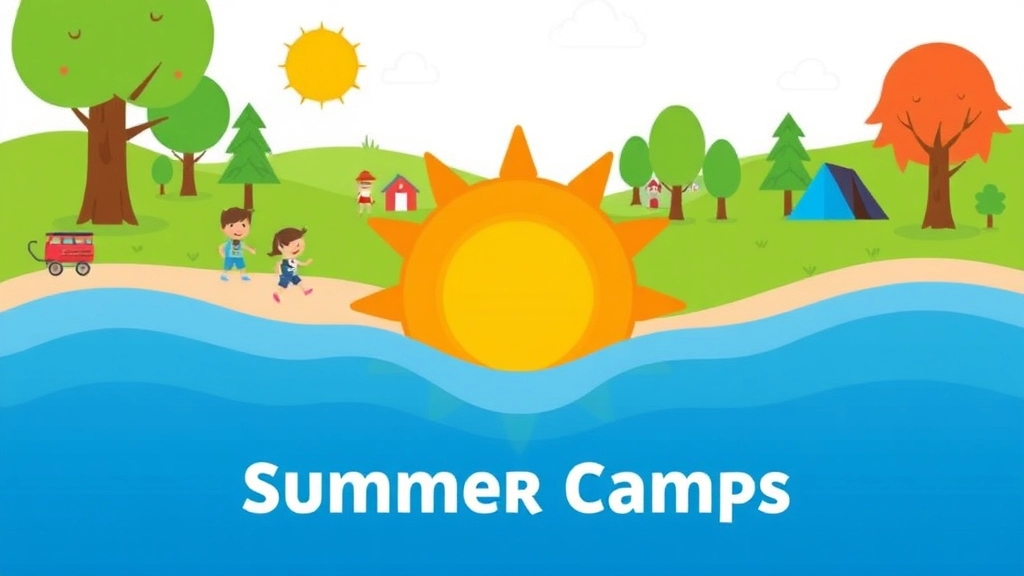
Ever wondered what types of summer camps are out there?
You’re not alone.
Parents often ask, “Which camp is right for my kid?” or “What options do we even have?”
Let’s break it down.
Traditional Camps
Think classic.
Kids swimming, hiking, and roasting marshmallows.
These camps offer a bit of everything.
From arts and crafts to sports.
Perfect for kids who want a well-rounded experience.
Specialty Camps
Got a kid who’s obsessed with something specific?
Like coding, soccer, or theatre?
Specialty camps focus on one main activity.
Ideal for kids who want to dive deep into their passion.
Academic Camps
Summer learning doesn’t have to be boring.
Academic camps make subjects like maths, science, and literature fun.
Great for kids who love to learn or need a little extra help.
Adventure Camps
For the thrill-seekers.
These camps offer activities like rock climbing, kayaking, and zip-lining.
Perfect for kids who love the outdoors and a good challenge.
Arts Camps
Got a budding artist or musician?
Arts camps focus on visual arts, music, dance, and drama.
Ideal for creative kids who want to hone their skills.
Sports Camps
From football to gymnastics, sports camps cover it all.
These camps focus on improving skills and teamwork.
Great for kids who are active and love competition.
Religious Camps
These camps incorporate religious teachings and activities.
Perfect for families looking to blend faith and fun.
Special Needs Camps
Every kid deserves a great summer.
Special needs camps offer tailored activities and support.
Designed for kids with physical, emotional, or developmental needs.
So, What’s the Right Fit?
Think about your child’s interests and needs.
Do they want to try a bit of everything?
Or focus on one passion?
The right camp can make their summer unforgettable.
Key Activities at Summer Camps
Alright, let’s dive into the heart of summer camps â the activities. When parents think about sending their kids to camp, one of the first things that pop into their minds is, “What will my child be doing all day?” It’s a legit concern. You want to make sure your kid is not just having fun but also learning and growing. So, let’s break down the key activities at summer camps.
Outdoor Adventures
Summer camps are synonymous with outdoor adventures. Think about it: hiking, canoeing, and campfires. These activities are designed to get kids moving, exploring nature, and building a sense of adventure.
- Hiking: Kids get to explore trails, learn about local flora and fauna, and develop a love for nature.
- Canoeing/Kayaking: Water activities help kids build teamwork and coordination skills.
- Campfires: Perfect for storytelling, singing songs, and making s’mores. It’s all about bonding and creating memories.
Sports and Games
Sports are a staple at most summer camps. Whether it’s a casual game of soccer or an intense round of capture the flag, sports activities keep kids active and teach them valuable lessons about teamwork and perseverance.
- Team Sports: Soccer, basketball, and volleyball are popular choices.
- Individual Sports: Archery, swimming, and tennis offer kids a chance to shine on their own.
- Group Games: Capture the flag, dodgeball, and relay races are all-time favourites that get everyone involved.
Creative Arts
Not every kid is a sports enthusiast, and that’s okay. Summer camps often offer a range of creative arts activities to cater to different interests.
- Arts and Crafts: Painting, pottery, and jewellery making allow kids to express their creativity.
- Drama and Theatre: Kids can participate in plays or improv sessions, boosting their confidence and public speaking skills.
- Music and Dance: From learning a new instrument to participating in dance-offs, these activities are a hit.
Educational Programs
Learning doesn’t stop just because school is out. Many camps integrate educational programs that are both fun and informative.
- STEM Activities: Science experiments, coding workshops, and robotics are becoming increasingly popular.
- Nature Education: Camps often have programs that teach kids about ecology, wildlife, and conservation.
- Cultural Activities: Some camps offer language classes, cooking workshops, and history lessons.
Social and Life Skills
One of the most underrated aspects of summer camps is the focus on social and life skills. These activities are designed to help kids grow emotionally and socially.
- Team Building Exercises: Activities like trust falls and problem-solving tasks help kids develop teamwork and leadership skills.
- Conflict Resolution Workshops: These sessions teach kids how to handle disagreements and communicate effectively.
- Daily Chores: Simple tasks like making their bed or cleaning up after meals teach responsibility and independence.
Specialised Camps
Some camps focus on specific interests or skills. If your child has a particular passion, there’s likely a camp tailored just for that.
- Sports Camps: For kids who are serious about sports, these camps offer intensive training.
- Arts Camps: Focused on fine arts, performing arts, or music.
- Academic Camps: For kids who want to get ahead in subjects like maths, science, or literature.
Benefits of Attending Summer Camp
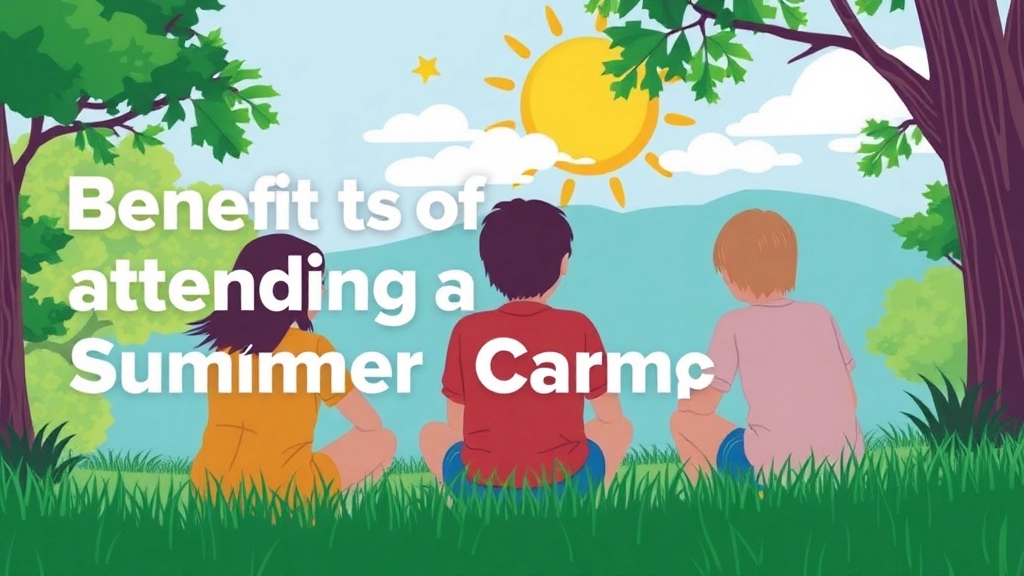
Alright, let’s dive into it.
Why should your kid go to summer camp?
First off, summer camp isn’t just about roasting marshmallows and telling ghost stories.
It’s a whole package of benefits that can seriously impact your child’s development.
Here’s why:
Social Skills on Steroids
At camp, kids meet new people.
They learn to make friends, work in teams, and navigate social dynamics.
Think about it.
When was the last time your kid had to share a bunk bed with someone they just met?
Independence and Confidence
Camps push kids out of their comfort zones.
They have to make decisions without you hovering around.
This builds independence and confidence.
Trust me, you’ll see a different kid coming home.
Physical Activity
Say goodbye to the screen time battle.
Camps are packed with activities that get kids moving.
From swimming to hiking, they’re burning energy and staying fit.
Learning New Skills
Whether it’s archery, coding, or drama, camps offer a buffet of skills.
Kids get to try new things and discover hidden talents.
Emotional Growth
Being away from home helps kids manage emotions.
They learn resilience and how to handle homesickness.
Lifelong Memories
Ask anyone who’s been to camp.
They’ll tell you about the lifelong friends and unforgettable experiences.
Nature Connection
Most camps are set in beautiful natural settings.
This gives kids a break from urban life and a chance to connect with nature.
Academic Boost
Some camps focus on academics or specific skills like STEM.
These camps can give your kid a leg up in school.
Stress Relief
Kids need a break from their routine too.
Camp is a great way to unwind and have fun.
Real Talk
I remember my first summer camp.
I was nervous, but it turned out to be one of the best experiences of my life.
I learned to kayak, made friends, and came back more confident.
Quick Recap
- Social Skills: Making friends, teamwork.
- Independence: Decision-making, confidence.
- Physical Activity: Staying fit.
- New Skills: Discovering talents.
- Emotional Growth: Resilience.
- Lifelong Memories: Unforgettable experiences.
- Nature: Connection with the environment.
- Academic Boost: Skill development.
- Stress Relief: Fun and relaxation.
So, if you’re on the fence about sending your kid to camp, think about these benefits.
It’s more than just a holiday.
It’s a growth opportunity.
Choosing the Right Summer Camp for Your Child
So, you’re on the hunt for the perfect summer camp for your child, huh? It’s a big decision, and I get it. You want to ensure your kid has a blast while also being safe and maybe even learning a thing or two. Let’s break it down and make this choice a whole lot easier.
What Are Your Child’s Interests?
First off, what does your kid love doing? Are they into sports, arts, science, or maybe they just want to explore the great outdoors? Identifying their interests can narrow down the options quickly.
- Sports Camps: Think football, basketball, tennis, or even niche sports like fencing.
- Arts Camps: Perfect for those who love painting, acting, or music.
- Science and Tech Camps: Ideal for future Einsteins and tech wizards.
- Adventure Camps: For the kids who can’t get enough of hiking, kayaking, and camping.
Location, Location, Location
Next up, how far are you willing to travel? Some parents prefer something close to home, while others are okay with sending their kids out of town.
- Local Camps: Easier for drop-off and pick-up, and you can visit if needed.
- Out-of-Town Camps: Often offer unique experiences that local camps can’t match.
Camp Duration
How long do you want your child to be away? Camps can range from a few days to several weeks.
- Short-Term Camps: Great for first-timers or younger kids.
- Long-Term Camps: Ideal for older kids who are ready for a more immersive experience.
Camp Philosophy and Values
Each camp has its own vibe and set of values. Do some digging to find out what they stand for. Do they focus on teamwork, personal growth, or maybe environmental stewardship? Make sure it aligns with what you want for your child.
Staff and Safety
Safety is non-negotiable. What are the staff qualifications? Are they trained in first aid and child development? Look for camps with a low camper-to-counselor ratio.
- Staff Training: Ensure they have proper certifications.
- Safety Measures: Check their protocols for emergencies.
Reviews and Recommendations
Word of mouth is gold. Ask other parents for recommendations and read online reviews. Sometimes, the best insights come from those who’ve been there, done that.
Cost and Financial Aid
Let’s talk money. Camps can get pricey, but many offer scholarships or financial aid. Don’t let cost be the only factor; weigh it against the value your child will get.
- Budget-Friendly Options: Look for local community camps.
- Scholarships: Many camps offer financial assistance.
Real-Life Example
Let me share a quick story. A friend of mine was torn between a local arts camp and a tech camp two hours away for her 10-year-old. Her son loved both art and coding. After some serious chats with him, they decided on the tech camp. He came back not only with new coding skills but also with a newfound confidence. Sometimes, stepping out of the comfort zone is the best choice.
Final Thoughts
Choosing the right summer camp for your child doesn’t have to be a headache. Focus on their interests, consider the location and duration, check out the camp’s philosophy, ensure staff qualifications, and look at costs and reviews. With these tips, you’ll find a camp that’s a perfect fit. Happy camping!
For more detailed information, you might want to check out our Top Summer Camp Games and Activities Guide and our Ultimate Guide to Summer Camp Layout Design.
Overnight vs. Day Camps
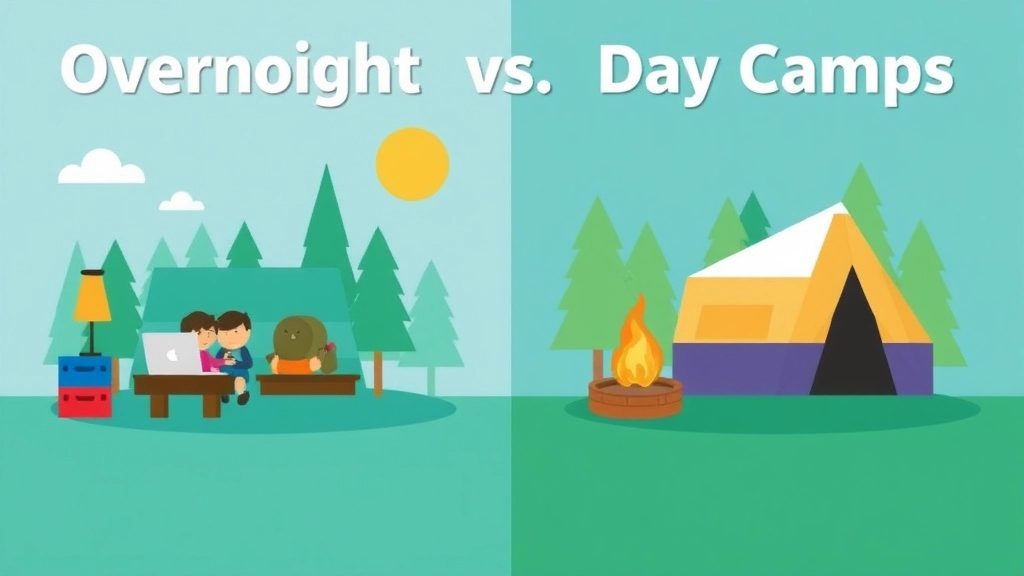
Ever wondered whether to send your kid to an overnight camp or just stick with a day camp?
You’re not alone.
This is a big decision, and it comes with its own set of questions and worries.
Let’s break it down.
The Essentials: Overnight Camps
Overnight camps are the full package.
Kids stay at the camp for a week or more, sleeping in cabins or tents.
They eat, play, and learn together 24/7.
Why consider overnight camps?
- Independence: Kids learn to be self-reliant.
- Friendships: Strong bonds form when kids spend all day and night together.
- Immersive Experience: They dive deep into activities without the daily commute.
But hey, it’s not all sunshine and rainbows.
Concerns with overnight camps:
- Homesickness: Some kids might struggle being away from home.
- Cost: Usually pricier than day camps.
- Safety: You might worry about who’s looking after your child.
The Essentials: Day Camps
Day camps are more like a 9-to-5 job for kids.
They go in the morning and come back home in the evening.
Why consider day camps?
- Routine: Kids get the camp experience but sleep in their own bed.
- Cost: Generally more affordable.
- Flexibility: Easier to fit into a family’s schedule.
But, there’s a flip side.
Concerns with day camps:
- Less Immersive: Kids might not form as strong connections.
- Logistics: Daily drop-offs and pick-ups can be a hassle.
- Limited Activities: Some activities are better suited for overnight stays.
Making the Choice
So, how do you choose?
Here are some quick tips:
- Know Your Child: Are they independent or do they get homesick?
- Budget: Can you afford the extra cost of overnight camps?
- Convenience: Does your schedule allow for daily drop-offs and pick-ups?
- Goals: What do you want your child to get out of the camp?
Real Stories
I remember a friend who sent her son to an overnight camp for the first time.
He was a bit nervous but came back more confident and with a bunch of new friends.
On the flip side, another friend chose a day camp for her daughter, who thrived in a structured environment and loved coming home every evening to share her adventures.
Safety Measures and Staff Qualifications
Hey, let’s talk about something that’s on every parent’s mind when it comes to summer camps: safety measures and staff qualifications. You want your kids to have fun, but you also want them safe. So, what should you be looking for?
Real Concerns, Real Answers
First off, you’re probably wondering: “How do I know my child will be safe?” It’s a legit question. Here’s what you need to know:
- Background Checks: Camps should run thorough checks on all staff. No exceptions.
- First Aid Training: Every staff member should be first aid certified. It’s non-negotiable.
- Emergency Protocols: Camps need clear, practiced plans for emergencies. Ask about them.
Staff Qualifications
Let’s break down what makes camp staff qualified:
- Experience: Look for staff with experience in childcare or teaching.
- Specialised Skills: If it’s a sports camp, coaches should have relevant certifications. Same goes for arts or science camps.
- Ratio: A low staff-to-camper ratio is key. More eyes, more safety.
What to Ask
When you’re checking out camps, don’t be shy. Ask questions like:
- “What’s your staff training process?”
- “How do you handle medical situations?”
- “What’s the supervision like during activities?”
Real Stories, Real Peace of Mind
I once spoke to a parent whose kid went to a camp with a surprise fire drill on the first day. The staff handled it like pros, and it gave everyone confidence in their training.
Safety Tips Checklist
Here’s a quick checklist to keep handy:
- Check Accreditation: Look for camps accredited by national organisations. It’s a good sign they meet high standards.
- Visit the Camp: If possible, visit beforehand to see the facilities and meet the staff.
- Talk to Other Parents: Word of mouth is powerful. Find out what other parents say about the camp’s safety.
Age-Appropriate Safety
Safety measures should be age-specific. Younger kids need more supervision, while older kids might need more guidance on using equipment safely. For more insights on camps for younger children, check out our guide on summer camp for preschoolers.
Special Needs
If your child has special needs, ensure the camp has the right accommodations and trained staff. It’s crucial for their safety and enjoyment. For camps that offer specialized programs, explore our list of ADHD summer camps.
Age-Appropriate Activities and Programs

Alright, let’s dive into a biggie: Age-Appropriate Activities and Programs at summer camps.
Ever wondered if your kid will actually enjoy the activities at camp? Or if they’ll be safe and suitable for their age?
You’re not alone.
It’s a common concern for many parents, and rightly so.
Finding the right fit can make or break the camp experience.
Why Age Matters
Kids of different ages have different needs, capabilities, and interests.
What excites a 7-year-old might bore a 14-year-old to tears.
And vice versa.
So, camps need to tailor their activities to match these varying age groups.
Activities for Younger Children (Ages 5-8)
For the little ones, it’s all about fun and discovery.
Think:
- Arts and Crafts: Simple, creative projects that let their imaginations run wild.
- Nature Walks: Exploring the outdoors, spotting bugs, plants, and maybe the occasional squirrel.
- Story Time: Engaging tales that captivate their young minds.
- Swimming: Supervised splashing around in the pool.
These activities are designed to be safe, engaging, and just challenging enough.
Activities for Tweens (Ages 9-12)
Now, as kids get a bit older, they crave more excitement and a bit of independence.
Here’s what works:
- Team Sports: Football, basketball, or even a friendly game of capture the flag.
- Science Experiments: Hands-on projects that make learning fun.
- Adventure Courses: Low ropes, zip lines, and other challenges that build confidence.
- Creative Workshops: More advanced arts, drama, or music sessions.
Activities for Teens (Ages 13-17)
Teens are a different beast altogether.
They want activities that are challenging, social, and sometimes even a bit edgy.
Consider:
- Leadership Programs: Camps often offer courses that help teens develop leadership skills.
- Advanced Sports: Competitive games, training sessions, and maybe even a camp tournament.
- Outdoor Adventures: Hiking, kayaking, or mountain biking.
- Tech and Media: Film-making, coding classes, or digital art.
Real Stories
I remember talking to a parent who was worried her 10-year-old wouldn’t fit in at camp.
Turns out, the camp had a perfect blend of activities that matched his interests.
He came back more confident, with new skills and a bunch of new friends.
Key Takeaways
- Match Interests: Make sure the camp offers activities your child is genuinely interested in.
- Check Safety: Ensure all activities are supervised and age-appropriate.
- Ask Questions: Don’t be afraid to ask the camp directors about their programs.
Choosing the right camp with the right activities can make a world of difference.
So, when you’re looking at camps, keep age-appropriate activities at the top of your checklist.
It’s the secret sauce to a fantastic summer camp experience.
And remember, the keyword here is Age-Appropriate Activities and Programs.
It’s the key to making sure your child has a blast and stays safe.
Got any more questions? Feel free to ask.
I’m here to help.
Special Needs Accommodations at Camps
Alright, let’s get real. If you’re a parent of a child with special needs, you’ve probably got a ton of questions about summer camps. Can they handle my kid’s unique requirements? Will my child be safe and happy? These are legit concerns, and I’m here to break it down for you.
What Are Special Needs Camps?
Special needs camps are designed to cater to children with various disabilities, whether physical, emotional, or developmental. These camps are equipped with the facilities and staff to ensure that your child has a fantastic and safe experience.
Why You Should Consider Special Needs Camps:
- Tailored Activities: Activities are modified to fit your child’s abilities.
- Trained Staff: Staff members are trained to handle medical and emotional needs.
- Inclusive Environment: Your child won’t feel left out or different.
Key Features to Look For
When choosing a camp for your child with special needs, there are a few critical elements to keep in mind:
- Staff Qualifications: Look for camps where staff have training in special education, first aid, and emergency procedures.
- Medical Support: Ensure there’s a nurse or medical professional on-site at all times.
- Accessibility: Check if the camp facilities are wheelchair accessible and if they have adaptive equipment.
- Low Staff-to-Camper Ratio: More staff means more attention for your child.
Real Talk: What Parents Worry About
“Will they understand my child’s needs?”
Absolutely, but you need to do your homework. Call the camp, ask questions, and if possible, visit beforehand.
“What if my child feels isolated?”
Many special needs camps focus on building a sense of community. They have inclusive activities that encourage social interaction.
“Is it safe?”
Safety is always a top priority. Camps usually have strict protocols for medication, emergencies, and general supervision.
Stories from the Campfire
Let me tell you about Sarah. She has a son, Jake, who has autism. Sarah was super anxious about sending Jake to camp. But after a lot of research, she found a camp with a stellar reputation. Jake had the time of his life, made friends, and came back more confident. Sarah’s biggest takeaway? The right camp can be a game-changer.
Making It Happen: Steps to Take
- Research: Start with a Google search for special needs camps in your area. Check out reviews and ratings.
- Ask Questions: Don’t shy away from asking detailed questions about staff qualifications, daily routines, and safety measures.
- Visit: If possible, visit the camp to see the facilities and meet the staff.
- Talk to Other Parents: Join forums or local groups to get recommendations and hear about other parents’ experiences.
If you’re looking for a comprehensive guide to summer camps, check out our complete guide to summer camps. For those interested in specific programs, our article on Emory summer camps covers everything from registration to safety protocols.
History and Evolution of Summer Camps
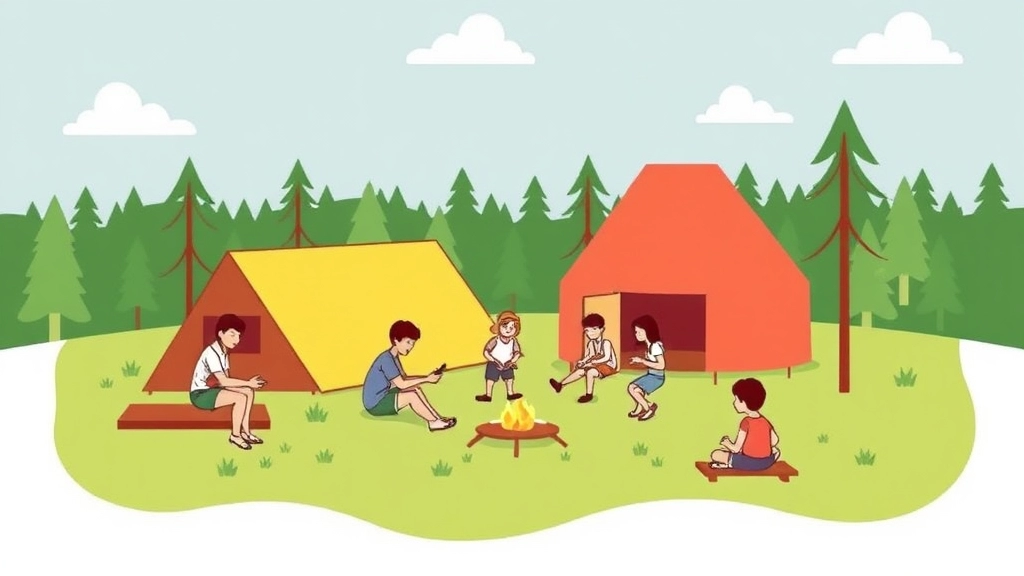
Ever wondered where summer camps came from?
Why do we send our kids off to these places every summer?
Let’s dive into the history and evolution of summer camps.
The Birth of Summer Camps
The idea of summer camps started in the late 19th century. Back then, it was all about getting kids out of the city and into nature.
The first recognised camp was the Gunnery Camp, started by Frederick William Gunn in Connecticut in 1861. He believed kids needed a break from city life. Fresh air, outdoor activities, and a bit of discipline.
The Growth of Summer Camps
By the early 20th century, summer camps were popping up everywhere. Parents saw the benefits. Kids were learning new skills, making friends, and growing more independent.
Camps started to specialise. Some focused on sports, others on arts or academics. There was something for everyone.
Modern-Day Summer Camps
Fast forward to today. Summer camps have evolved massively. Now, there are camps for everything. Tech camps, adventure camps, music camps, you name it.
The core idea remains the same: give kids a break from their daily routine. But now, it’s also about helping them discover their passions.
Why This Matters
Understanding the history helps us see why camps are still relevant. They’ve adapted with the times. But the goals haven’t changed much:
- Personal Growth: Camps push kids out of their comfort zones.
- Skill Development: Whether it’s coding or canoeing, kids learn something new.
- Social Skills: Making friends and working as a team.
Real Stories
I remember my first summer camp. No smartphones, just a bunch of us trying to figure out how to pitch a tent. We failed miserably, but we laughed a lot. That’s the magic of summer camp.
It’s these experiences that shape you.
Financial Considerations: Costs and Scholarships
Alright, let’s dive into the nitty-gritty of summer camp costs and scholarships. If you’re like most parents, you’re probably wondering, âHow much is this going to set me back?â Well, let’s break it down.
Understanding the Costs
Summer camps can range from affordable to eye-watering. Here’s what you need to know:
- Day Camps vs. Overnight Camps: Day camps are usually cheaper. You’re looking at a few hundred pounds per week. Overnight camps? They can hit the thousands.
- Specialised Camps: Got a budding scientist or artist? Specialised camps offer niche experiences but often come with a higher price tag.
- Location: Camps in popular areas might cost more. It’s like real estateâlocation matters.
What’s Included?
When checking out camps, always ask what’s included in the fee:
- Meals: Are they covered, or do you need to pack lunches?
- Activities: Some camps charge extra for certain activities.
- Transport: Is there a bus service, and is it included?
Scholarships and Financial Aid
Now, let’s talk about scholarships. Yes, they exist, and they can be a lifesaver.
Types of Scholarships
- Need-Based: For families who need a little financial help.
- Merit-Based: For kids who excel in certain areas.
- Organisation-Sponsored: Groups like Scouts or local charities often offer scholarships.
How to Apply
- Early Bird: Apply early. Scholarships can run out fast.
- Complete Applications: Don’t leave anything out. Incomplete applications might be tossed aside.
- Ask Questions: Don’t hesitate to contact the camp for guidance.
Real Concerns and Solutions
Here’s the deal: I’ve been there, staring at the costs and wondering if it’s worth it. Trust me, it is. Camps offer experiences that stick with kids for life. But if the price is daunting, consider these tips:
- Payment Plans: Many camps offer them. Spread the cost over several months.
- Discounts: Some camps offer sibling discounts or early registration deals.
- Fundraising: Some families host bake sales or car washes to help cover costs.
For more detailed advice on managing camp expenses, check out our guide on affordable summer camps. Additionally, if you’re curious about the overall expenses, our comprehensive guide on how much summer camp costs can provide more insights.
Common Questions Parents Ask About Summer Camps
Summer camps can be a big deal for both kids and parents.
You’ve got questions.
I’ve got answers.
Let’s dive in.
What’s the best age for my child to start camp?
Parents often wonder when their child is ready for camp.
Here’s the deal:
- Day camps: Ideal for kids as young as 5.
- Overnight camps: Usually best for kids 7 and up.
It all depends on your child’s comfort level and maturity.
How do I know the camp is safe?
Safety is a top concern, no doubt.
Look for these key points:
- Accreditation: Camps accredited by the British Activity Providers Association (BAPA) follow strict safety standards.
- Staff qualifications: Check if the staff are trained in first aid and have undergone background checks.
- Emergency procedures: Ask about their protocols for emergencies.
What if my child has special needs?
Many camps cater to children with special needs.
Here’s what to check:
- Specialised staff: Ensure they have qualified personnel to handle specific needs.
- Inclusive activities: Look for camps that offer activities tailored to all abilities.
- Accessibility: Confirm the camp facilities are accessible.
How much does summer camp cost?
Costs can vary widely.
Here’s a rough breakdown:
- Day camps: £20-£50 per day.
- Overnight camps: £200-£600 per week.
Don’t forget to ask about scholarships or financial aid. For a detailed overview of costs, check out our guide on summer camp costs, factors, and savings tips.
What should my child pack?
Packing can be a headache.
Here’s a simple list:
- Clothing: Comfortable and weather-appropriate.
- Toiletries: Toothbrush, toothpaste, soap, etc.
- Bedding: Sleeping bag or bed linens for overnight camps.
- Extras: A water bottle, sunscreen, and any medications.
For more tips on what to pack, visit our ultimate packing guide for summer camp essentials.
How do I handle homesickness?
Homesickness is common.
Here are some tips:
- Preparation: Talk to your child about what to expect.
- Comfort items: Pack a favourite toy or photo.
- Stay positive: Encourage them to embrace the new experience.
Can I visit the camp?
Most camps allow visits.
Here’s what to do:
- Check policies: Confirm the camp’s visiting hours and rules.
- Plan ahead: Schedule your visit to avoid disrupting activities.
- Stay connected: Some camps offer regular updates via email or social media.
What activities will my child do?
Camps offer a range of activities.
Common ones include:
- Sports: Football, swimming, archery.
- Arts and crafts: Painting, pottery, drama.
- Adventure: Hiking, rock climbing, canoeing.
How do I choose the right camp?
Choosing the right camp can be tough.
Here’s a quick guide:
- Interests: Pick a camp that aligns with your child’s hobbies.
- Location: Consider the camp’s proximity to home.
- Reputation: Read reviews and ask other parents for recommendations.
FAQs about Summer Camps
What is the definition of a summer camp?
A summer camp is a supervised program for children or teenagers conducted during the summer months. Kids engage in various activities, ranging from outdoor adventures to educational programs.
What types of summer camps are available?
There are several types of summer camps, including traditional camps, specialty camps, academic camps, adventure camps, arts camps, sports camps, religious camps, and special needs camps. Each type focuses on different activities and interests.
What are the benefits of attending a summer camp?
Summer camps offer numerous benefits such as improved social skills, increased independence and confidence, physical activity, learning new skills, emotional growth, lifelong memories, a connection with nature, an academic boost, and stress relief.
How do I choose between an overnight camp and a day camp?
Consider factors such as your child’s independence, your budget, convenience, and what you want your child to gain from the camp. Overnight camps offer a more immersive experience, while day camps provide routine and affordability.
Are there age-appropriate activities and programs at summer camps?
Yes, summer camps tailor their activities to different age groups. Younger children (ages 5-8) engage in simple, fun activities, tweens (ages 9-12) enjoy more exciting and independent activities, and teens (ages 13-17) participate in challenging and social activities.
What is the history and evolution of summer camps?
Summer camps originated in the late 19th century to get kids out of the city and into nature. The first recognized camp was the Gunnery Camp in 1861. Over the years, camps have evolved to include various specializations, but the core idea remains to provide kids with a break from their daily routine and help them discover their passions.
Why are summer camps still relevant today?
Summer camps continue to be relevant because they offer personal growth, skill development, and social skills. They adapt to modern interests while maintaining their foundational goals of providing a break from routine and fostering new experiences.
What should I consider when choosing a summer camp for my child?
When choosing a summer camp, consider your child’s interests, the camp’s safety measures, the type of camp (day or overnight), the activities offered, and your budget. It’s also helpful to ask camp directors about their programs and how they ensure age-appropriate activities.
Can special needs children attend summer camps?
Yes, there are special needs camps designed to offer tailored activities and support for children with physical, emotional, or developmental needs. These camps ensure that every child has a great summer experience.
References
-
History of Camp
-
Types of Summer Camps
-
Different Types of Summer Camps

